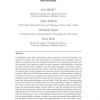Free Online Productivity Tools
i2Speak
i2Symbol
i2OCR
iTex2Img
iWeb2Print
iWeb2Shot
i2Type
iPdf2Split
iPdf2Merge
i2Bopomofo
i2Arabic
i2Style
i2Image
i2PDF
iLatex2Rtf
Sci2ools
EOR
2010
2010
Two-stage flexible-choice problems under uncertainty
A significant input-data uncertainty is often present in practical situations. One approach to coping with this uncertainty is to describe the uncertainty with scenarios. A scenario represents a potential realization of the important parameters of the problem. In this paper we apply a recent approach, called flexibility, to solving two-stage flexible-choice problems. The first stage represents the present, where a decision maker must plan ahead to make a decision to hedge against uncertainty in the second stage, which represents the uncertain future, and is described as a set of scenarios. When one of the future scenarios is realized, a decision maker is willing to pay some recourse cost to augment the earlier solution to be more suitable for the realized scenario. Since all of the future scenarios are known, it is reasonable to presume that their desired solutions are also known. Thus, the aim of a decision maker is to find a solution in the present that is as easy as possible to ada...
| Added | 10 Dec 2010 |
| Updated | 10 Dec 2010 |
| Type | Journal |
| Year | 2010 |
| Where | EOR |
| Authors | Jurij Mihelic, Amine Mahjoub, Christophe Rapine, Borut Robic |
Comments (0)

